A LSO BY C HARLES O SGOOD
Kilroy Was Here (edited by Charles Osgood)
Nothing Could Be Finer Than a Crisis That Is
Minor in the Morning
Osgood on Speaking: How to Think on Your Feet
Without Falling on Your Face
See You on the Radio
The Osgood Files
Theres Nothing That I Wouldnt Do If You
Would Be My POSSLQ

FUNNY LETTERS FROM FAMOUS PEOPLE . Copyright 2003 by Charles Osgood. All rights reserved. No part of this book may be reproduced or transmitted in any form or by any means, electronic or mechanical, including photocopying, recording, or by any information storage and retrieval system, without written permission from the publisher. For information, address Broadway Books, a division of Random House, Inc.
BROADWAY BOOKS and its logo, a letter B bisected on the diagonal, are trademarks of Broadway Books, a division of Random House, Inc.
Visit our website at www.broadwaybooks.com
First edition published 2003
Library of Congress Cataloging-in-Publication Data
Funny letters from famous people / edited by Charles Osgood. 1st ed.
p. cm.
1. Letters. 2. American wit and humor. I. Osgood, Charles.
PN6131 .F86 2003
826.008017dc21 2002034214
eISBN: 978-0-7679-1177-1
v3.1
This book is dedicated to
Those dauntless men and women who,
Sometimes by truck, sometimes by feet,
In spite of snow and rain and sleet,
And heat of day, and gloom of night,
And dogs that bark and sometimes bite,
And handwriting thats hard to read,
Complete your rounds with all due speed,
Brave couriers, hats off to you
Who get those funny letters through!
C HAS . O SGOOD
CONTENTS
INTRODUCTION
Letter writing is close to becoming a lost art in this day of e-mail, the Internet, word processing, cell phones, and answering machines.
Many people today seldom if ever sit down and write actual letters anymore. On those rare occasions when they do try to write a letter, they often find that their letter-writing skills have atrophied. Besides, they cant find anything decent to write with.
If they find a ballpoint pen, it does not work. Somebody left the cap off and it dried up. Even if they do find a pen that works, something to write on is also a problem. Writing on a paper bag or the back of a junk-mail ad is considered bad form.
They cant remember where they put the stationery. No point in looking in the stationery drawer. It was never kept there. If they do find letter paper, they cant find a proper envelope.
If they do find a suitable envelope, they cant find the address book. If they do find the address book, it turns out to have only the old address, not the new one. Or, if it does have the current address, it doesnt include the Zip Code.
Even if all the foregoing somehow turn up, something else will be missing; the half-roll of postage stamps that used to be in the middle drawer over the desk. This drawer now contains nothing but old paper clips, thumb tacks, four pennies, the cap that belongs to the dried-up pen, a loose blazer button, etc. etc. No stamps.
In the unlikely event that a stamp of the correct denomination is found (if, indeed, they know what a first-class stamp sells for these days), and they remember what they wanted to say and manage to write it down, and put it in an envelope and address and seal and put a stamp on it, there is still one more crucial step, which is often overlooked.
To get a letter delivered, it is necessary to mail iti.e., drop it in a U.S. Postal Service mailbox. The stamped, addressed envelope is not going to drop itself into a mailbox. You have to go out in the rain, sleet, gloom of night, or whatever, and do it yourself. If you leave the letter on the kitchen counter, assuming that somebody else in the family will mail it for you, you will find it at least a year later with the stack of old magazines you are throwing out.
All this is very time consuming, and everybody is so busy nowadays watching television that we have neither the patience nor the inclination to go through it. So we dont exchange letters the way people used to, once upon a time when every letter was answered by another, which in turn required a response. This would go on and on for years, decades, lifetimes. And these letters were carefully saved!
These saved letters, preserving thoughts, feelings, and experiences, have been a gold mine for biographers of famous people over the centuries. (Most biographies are about high achievers, arent they? Why would anyone take all the time and go to all the trouble of researching and writing a big thick book about somebody nobody ever heard of or cares about?)
Where would David McCullough be without all those letters between John and Abigail Adams? Pity the poor biographer two hundred years from now having to rely on the collected e-mail exchanges of George W. and Laura Bush, or of Bill and Hillary Clinton. Not that it wouldnt be interesting, of course. Reading other peoples mail is always fascinating. But is e-mail saved anywhere except on your own hard drive and in the secret files of the National Security Agency?
Speaking of the NSA, which eavesdrops on the electronic transmissions of the whole world, we now take it as given that Big Brother has every e-mail ever senthowever frivolousdigitally stored, probably in the same gray government facility at Fort Mead, Maryland, that houses the grapes of wrath. But nobody will ever be allowed to see it. Its written STRICTLY OFF LIMITS to everybody.
As far as e-mail humor is concerned, the only way you can tell whether anything is supposed to be funny is via the punctuation  .
.
But a real letter about a real situation from a real person, especially a real politician, author, or show business celebrity? Now that can be funny!
C HARLES O SGOOD

I
POLITICIANS
Politics is never far from a politicians mind.
And in almost every politicians letter you can find
Pointing with pride while at the same time viewing with alarm,
As with wonderful dexterity he almost breaks his arm,
Spinning contradictions with such gymnastic knack
That with all humility he pats himself upon the back.
He often makes us laugh out loud; but what is most mysterious
Is why hes at his funniest when trying to be serious.
C HARLES O SGOOD
George Washington
W HEN IT CAME to the subject of marriage, George Washington certainly was of several minds, all of them witty.
A thirty-eight-year-old bachelor, one Tench Tilghman, wrote to General Washington to explain that he had gotten married while on his overstayed leave.
Washington wrote back:
Dear Tench:
We have had various conjectures about you. Some thought you were dead, others that you were married.


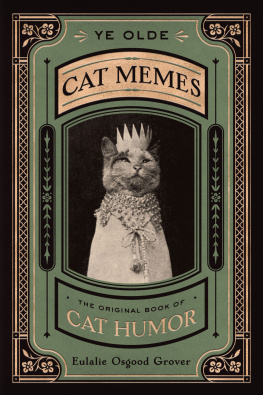
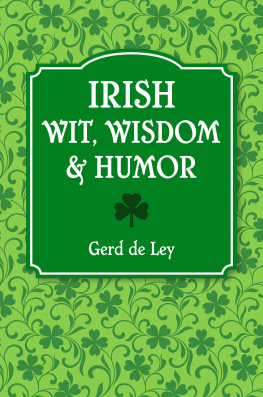

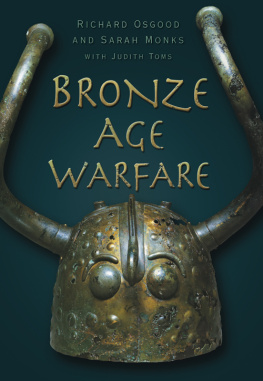

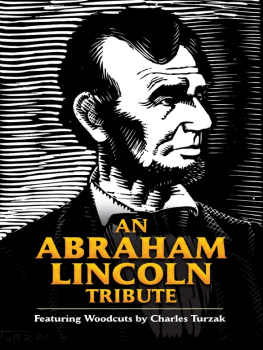
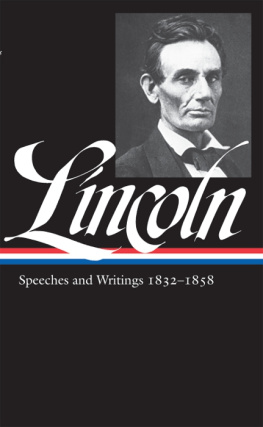
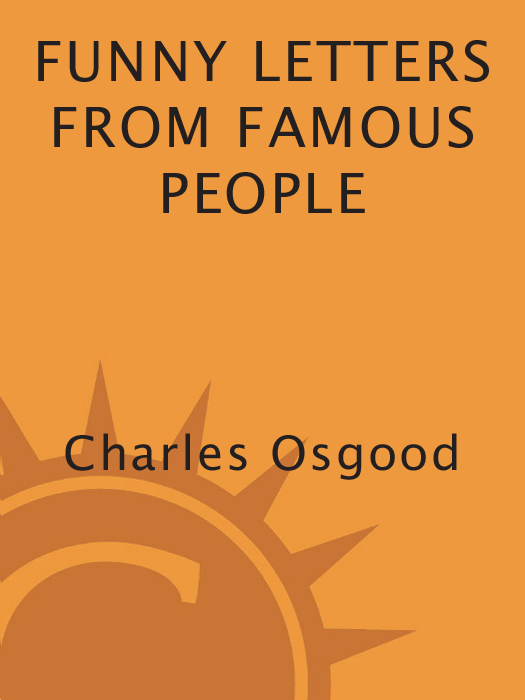
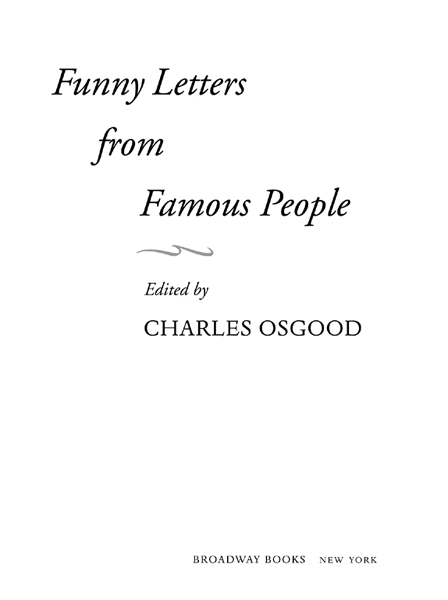

 .
. I
I